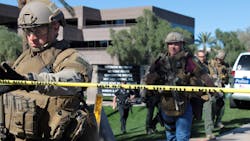Hero or Monster? Use-of-Force Moments Don't Tell Whole Story
For readers and/or movie buffs, “Angels & Demons” is almost immediately recognized as a novel turned movie written by Dan Brown and starring Tom Hanks. In that book/movie, angels refer to (generally) good people, while demons refer to bad people. (SPOILER ALERT) The biggest twist of the movie is when you find out that a person believed to be a good guy throughout the movie isn’t.
But step out of the fictional world and realize that someone can be both a hero and a monster, an angel and a demon. The challenge with that statement is that people and society in general seem to place a label on someone … and then never change it. In fact, there seems to be a general perception that once the person is labeled, the label can never be changed.
That might seem to make sense when we talk about criminals or nuns, nurses or abusive spouses, but with a little consideration it’s easy to see that it doesn’t make that much sense after all. While everyone would agree that abusive spouses are bad, does that mean the individual in question isn’t good in any other segment of their life? If we assume “once a criminal, always a criminal,” then the idea of criminal reform is moot, is it not?
A great many of us view law enforcement officers, and others in public safety, as heroes, while some of us seem to demonize all police officers based on the actions of just one or two. At the end of the day, it’s important to realize that the good/bad, angel/demon debate isn’t carved in stone. Every human being has good and bad in them. We’ve all seen that throughout our lives in our friends, families, coworkers, etc. All of us make mistakes or “do bad,” but that doesn’t make us bad people; it just means we made a mistake. It was a momentary detachment from our usual selves.
With that understanding, what happens when someone, generally considered a hero, has to do something that seems bad, harsh or downright evil? We usually accept that using violence is bad. Criminals and abusers use violence for either personal gain or to gain a feeling of power. Either way, it’s a selfish motivation. Such selfish use of violence is unacceptable, right?
But what if someone is attacking someone else and a police officer shows up, forced to use violence to stop the attack? Is that good or bad? 99.9% of the population we serve would agree that a police officer protecting a victim, having to exercise controlled and judicious force (violence) is good. Morally, it’s good. Visually… maybe not so much.
In today’s world, we’ve all seen video clips captured by citizens on cellphones, that make law enforcement professionals look bad; as if they are doing wrong; something immoral or unethical. That doesn’t mean that the officer is a monster, evil, a demon, etc. It just means that, in that moment, he had to use necessary force to gain control and affect an arrest. In fact, the officer’s use of force is both good and necessary because it's all that stops the bad guy from doing further harm to the victim.
With all that in mind, what’s your reaction to the hero who displays a monstrous side? Many officers worry about what their friends or family will think if they have to see the officer exercise his authority or use force in the course of his duties. Many officers don’t want friends or family doing ride-alongs anywhere near where they work because of that very fear. (Author’s Note: I had this conversation with my wife because she did several ride-alongs in my patrol area, but NOT with me. She assured me that she knew my heart and wouldn’t think any less of me if she saw me having to use force.)
It's vital that we understand, and vocally support the concept, that the judicious use of force by law enforcement professionals acting in any protective or enforcement capacity, is both good and necessary. When voices are raised about the results of an officer’s justified use of force, we need to combine our voices to support the officer, explaining how and why that use of force was both necessary and justified; that it was a good use of force.
There have been tools in place for decades that examine police use of force and provide disciplinary measures if force is improperly used. The assumption used to be that the use of force was justified and acceptable unless an investigation proved otherwise. The exact opposite seems to be true now: Any use of force is assumed to be wrong, immoral, unprofessional or unethical until an investigation proves it wasn’t. While that is backward, it’s what we’re all too often stuck with.
Keep it in mind as you start to voice your thoughts about a given incident. If you weren’t on the scene or involved in the event, do you really have all the facts to render judgment? The public does that all the time based on minimal video clips and zero circumstantial knowledge. Let’s make sure we don’t add to that problem.

Lt. Frank Borelli (ret), Editorial Director | Editorial Director
Lt. Frank Borelli is the Editorial Director for the Officer Media Group. Frank brings 20+ years of writing and editing experience in addition to 40 years of law enforcement operations, administration and training experience to the team.
Frank has had numerous books published which are available on Amazon.com, BarnesAndNoble.com, and other major retail outlets.
If you have any comments or questions, you can contact him via email at [email protected].



